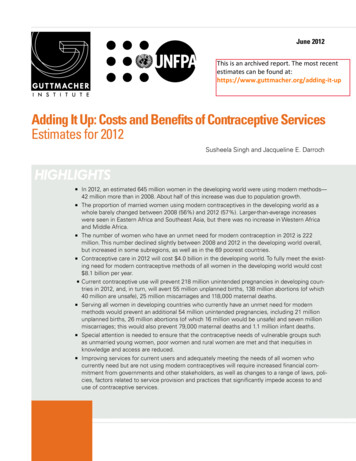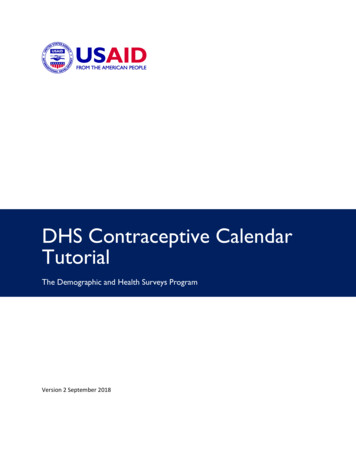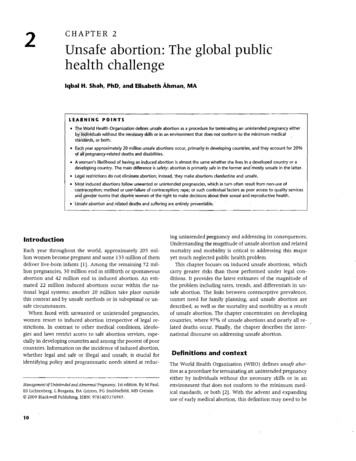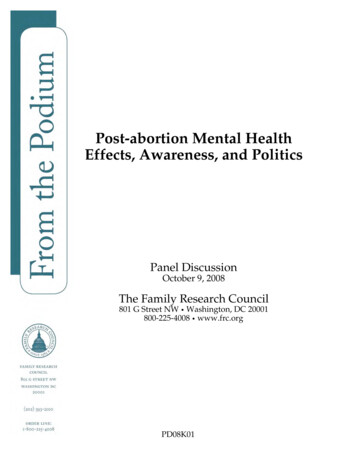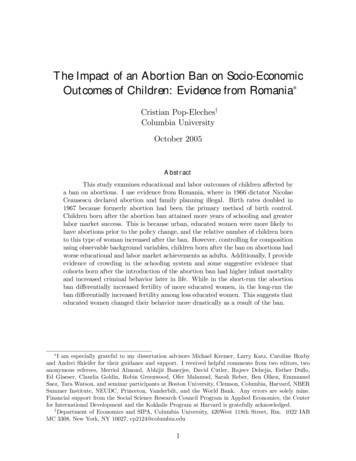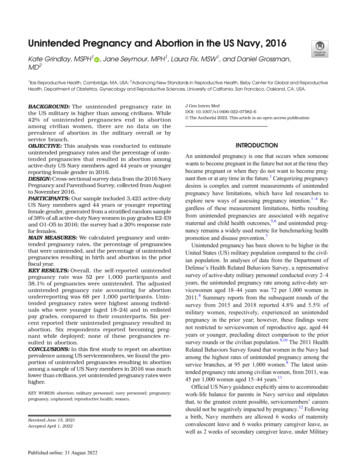
Transcription
Post-abortion contraceptive use and continuation in NepalMahesh Puri, Corinne Rocca, Maya Blum, Cynthia Harper, Deepak Joshi and Jillian HendersonBackgroundUntil 2002, abortion was illegal in almost all circumstances in Nepal. However, research showedthat induced abortion was clandestinely widespread in the country and contributed significantlyto high maternal mortality and morbidity rates (FHD/MOH, 1998; CREHPA, 2000). In 2002,Nepal broadly legalized abortion, taking a major step towards reducing high levels of maternaldeath, disability and illness. Safe abortion, however, is necessary but not sufficient to addressmaternal morbidity and mortality. The provision of post-abortion contraception is critical forpreventing future unintended pregnancies and repeat abortion.With the expansion of safe abortion care in Nepal, there are new possibilities for improving thehealth of women. At the same time, maternal mortality remains high (280 per 100,000), andwomen continue to suffer significant levels of morbidity and mortality from pregnancy, unsafeabortion, and delivery (Suvedi et al. 2009). A key aspect of safe abortion care that has profoundpotential to improve the health and lives of women and their children is post-abortioncontraception. In a country where pregnancy, unsafe abortion, and childbirth put women’s livesat great risk, access to contraception, and counseling to help address barriers to use, are essentialto prevent morbidity and mortality from unwanted pregnancy.Government run hospitals in Nepal have policies requiring contraceptive services provision1
following abortion services, and all abortion clients receive post-abortion contraceptivecounseling. Not surprisingly, there are high levels of initial method acceptance, but little isknown about continuation of the method used after abortion (MOHP/CREHPA/Ipas, 2006). Aprospective study conducted before legalization of abortion showed that calendar and withdrawalwere the most commonly used methods (Tamang, 1996). The same study showed that one out ofevery six women with induced abortion became pregnant at least once during the 15 monthsfollowing the abortion, and a majority of the pregnancies were unplanned. A great deal haschanged for Nepal in the fifteen years since this study, including improvements to contraceptiveavailability and use (CREHPA, 2007). Contraceptive prevalence (modern method) in Nepal is43% and, on average, women have 1.1 more children than their stated ideal family size (MoHP,New Era and ICF, 2011). The unmet need for contraception is high; it is estimated that one infour women at risk of unintended pregnancy are not using a modern contraceptive method(MOHP 2007; Bhandari et al. 2006). One recent study of the oral contraceptive pill and DepoProvera among women in Nepal found that satisfaction with contraceptive counseling wasrelated to method continuation and satisfaction (Gubhaju, 2009a), but little is known about otherfactors contributing to continuation. Small cross-sectional studies have provided somedescriptive information about contraceptive knowledge and socio-demographic correlates of use(Tuladhar &Marahatta, 2008), but larger, rigorous studies examining contraceptive use andreasons for discontinuation following abortion are needed.Contraceptive use may be hampered by a number of factors, such as insufficient counseling,difficulties understanding or using methods, unacceptable side effects, non-availability ofmethods, relationships and demands of family members, or difficulty obtaining or affording2
method refills. Social Cognitive Theory (Bandura, 1986) provides a conceptual basis forconsidering the individual and contextual factors affecting contraceptive use and continuation.According to the theory, cognitive processes including knowledge, intentions, skills, and selfefficacy interact with emotion and the social environment to shape behaviors. The influence ofgender norms, power, relationships, and broad social conditions are recognized to be importantdeterminants of health behavi
(MOHP 2007; Bhandari et al. 2006). One recent study of the oral contraceptive pill and Depo-Provera among women in Nepal found that satisfaction with contraceptive counseling was related to method continuation and satisfaction (Gubhaju, 2009a), but little is known about other factors contributing to continuation.

